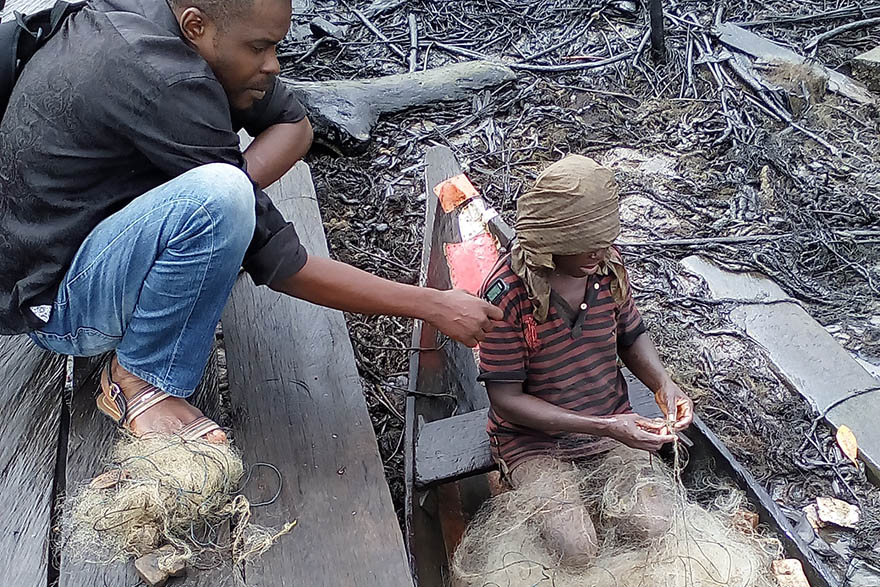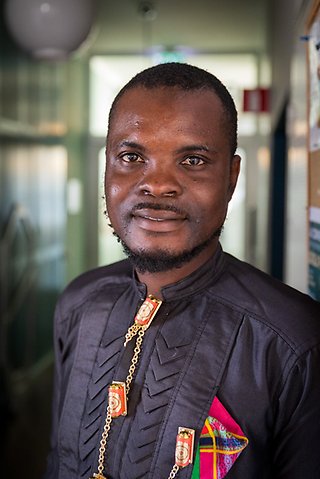Niger Delta communities caught in vicious cycle

An Ijaw fisher woman in a polluted river bank. Photo taken during data collection in Kokodiagbene community in Gbaramatu kingdom, Warri south west local government area, Delta state. Photo: Jackson Tamunosaki Jack
Artisanal crude oil refining exacerbates environmental degradation caused by decades of oil production by multinational companies in Nigeria’s Niger Delta region. Only the Nigerian government has the power to break the vicious cycle that is poisoning the mangroves and ruining life for the local population, according to NAI guest researcher Jackson Tamunosaki Jack.
The Rivers State of the Niger Delta in southern Nigeria, where Jack grew up, used to be full of fishing settlements, locally called “Borikiri”. In the 1960s and 1970s, Jack’s maternal grandfather, Peter Oru was a successful fisherman in Ido community of Asari Toru Local Government Area of Rivers state. He would leave home and head out in the maze of creeks and rivers he knew like the back of his hand, a part of the largest mangrove forest in Africa. After two or three months of fishing and selling his catch at a fishing settlement, he would return home with his earnings.
“My mother would tell me how women in the 1970s and 1980s, even into the early 1990s, would ferry so much fish caught around Bonny Island and neighbouring coastal communities to sell in the state capital of Port Harcourt. Nowadays, women are making the same trip to sell locally refined diesel and petrol concealed in jerrycans and plastic bags,” says Jack.
Many of the old fishing settlements have been converted into camps for artisanal oil refining, locally known as “Kpor Fire”. There, workers – mostly young men – cook crude oil which is processed into kerosene, diesel and petrol. In Rivers State alone there are hundreds of such refining points.
Jack’s uncle, Dabarasuam Peter, who inherited the fishing profession from his father now finds the activity unattractive and less rewarding due to devastating oil spills from artisanal refining camps. Much of the fish in the polluted creeks and rivers has died or sought its way out into the ocean. Fishermen who want to stay in business have to turn to deep sea fishing, an activity which is difficult without expensive equipment such as trawlers.
The Niger Delta is a region where the ground is full of oil. But it is also among the most polluted and poorest areas of the world. The forests are dying and the rivers are being poisoned as oil leaks from corroded or vandalized pipelines.

Jackson Tamunosaki Jack. Photo: Mattias Sköld
Jack, an environmental sociologist, is studying how local communities adapt to the changing living conditions and what makes individuals choose to work in the artisanal oil sector. His findings are disheartening. He describes the situation as a “livelihood dysfunctional trap”.
“People have few livelihood alternatives and are constrained by a lack of basic infrastructure. Yet they have to make ends meet. For the communities it becomes a vicious cycle, of pollution, re-pollution, and pollution,” he says.
This unregulated practice is destroying the sensitive eco-system of the mangrove at a greater pace than the large-scale, corporate oil industry. At the same time, the unique knowledge about the environment built up by fishing and farming communities over generations is being lost.
“Artisanal oil production is problematic, partly because the refinement technique leads to so much wastage. But also because so much crude oil is spilt when pipelines are tapped and during transportation. Large volumes of oil also leak into the rivers at the many refining points. These environmental effects are at the centre of the ecological crisis in the Niger Delta,” says Jack.
The vandalization and tapping of oil pipelines became common in the 1990s during the armed conflict between ethnic minority groups in the Niger Delta and the Nigerian government. The unrest was a reaction against the effects of the government’s joint ventures with multinational oil companies. Groups such as the Ogoni and the Ijaw demanded that local communities get a share of the earnings that came from the resources of their land.
Despite being the largest producer of crude oil in Africa, Nigeria imports almost all of its fuel. None of the country’s four refineries is operational. This national shortage has led to high demand for artisanal fuel, which is sold direct to businesses that need it for their generators or to petrol stations that sell it on at market price.
Jack stresses the need for environmental education in the communities and for a general reorientation of society and economy, away from the practices that are killing the environment and destroying traditional livelihood systems.
“But telling people to stop stealing and refining oil is not enough. They have to be provided with alternatives, with other ways to make a living apart from the damaging artisanal oil sector,” he says.
Years of initiatives from different actors have not managed to bring about the fundamental shift that is needed. As an example of misdirected effort, Jack mentions the implementation of the UN Environment Programme’s Hydrocarbon Pollution Remediation Project, a clean-up initiative in Ogoniland in Rivers State.
“While it is commendable that UNEP wants to clean up the environment, it is doing nothing to address the root of the problem. Commencing clean-up and remediation, while artisanal refining is widespread in the area and poses risks of re-pollution, makes the entire effort meaningless. It is like mopping the wet floor under a leaking roof,” Jack says.
It is the Nigerian government which holds the key to creating sustainable livelihood alternatives for the communities of the Niger Delta, Jack says. While some efforts have been made by the state, they lack the public institutions, infrastructure, provision of water and energy, all of which are necessary components to stimulate the local economy and create jobs.
“If there were alternatives, I don’t think anyone would want to work in the artisanal oil business, it is much too dangerous,” Jack says.
A tragic reminder of the dangers came in April 2022, when at least 110 people were burned alive in an explosion at a clandestine refinery in Imo State, east of the Niger river.
The problem is that oil money is standing in the way of development, according to Jack. Everyone is on the deal, from compromised oil company staff, to security personnel, public officials and politicians. People are getting rich either from selling the oil or from collecting bribes from those who want to sell it. Those with the power to create long-term solutions that can shift the economy and society away from oil, lack any incentive, he says.
“It is very difficult, but there is no getting around it. If you want to stop this vicious cycle, you have to start at the top. You have to start by addressing corruption.”
TEXT: Mattias Sköld
